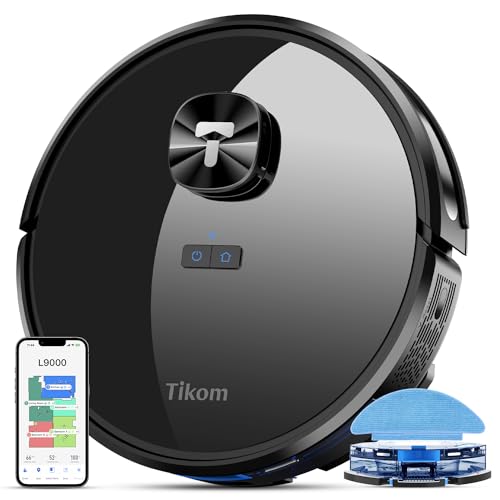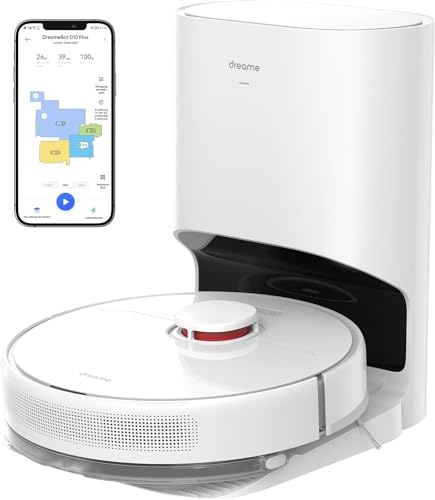A Peek Inside The Secrets Of Lidar Robot Vacuum
페이지 정보
작성자 Curtis 작성일24-08-09 20:38 조회33회 댓글1건관련링크
본문
Laser light is utilized by robot vacuums that create a detailed map to clean the space. This allows them to move more efficiently and efficiently, without crashing into objects.
 This sophisticated technology has influenced the trends in the market and consumer preferences and many consumers choosing to purchase robotic cleaners which are efficient, precise and flexibility.
This sophisticated technology has influenced the trends in the market and consumer preferences and many consumers choosing to purchase robotic cleaners which are efficient, precise and flexibility.Precision and Accuracy
Lidar is a vital technology that helps robots navigate within the home. It helps them avoid collisions and other obstacles. The system uses a laser sensor to send out a signal and then analyze the time required for the pulse bounce back from an obstacle to determine its distance. This creates a 3D model of the room. This allows robots to navigate around obstacles and cover a vast area efficiently without sacrificing anything.
This system is more effective than navigation systems that rely on ultrasonic or infrared sensors which rely on soundwaves. The sensor can detect the presence of solid objects or even a single dust tiny speck on the floor. It is also very accurate, so it's less likely that you will accidentally bump into furniture and other items at home.
A lidar can also work in dark and bright environments which allows the robot to operate in a variety of lighting levels. The sensors can also be used to detect changes in its environment, like moving furniture or adding a new item. This information is utilized by the robot to adapt its actions and facilitate a smoother cleaning process.
A robot with lidar technology can detect edge detection, a feature that helps keep from falling down stairs or other large variations between levels. This can lower the risk of damage being done to the vacuum cleaner or the home. It can also make the robot safer for children and pets who might come into contact with it.
Other navigation systems, such as cameras and gyroscopes, are also useful in the context robot vacuum cleaners. These types of technology aren't as precise as the laser-based sensor used in a lidar vacuum robot. In addition, they may require more setup and calibration to work effectively.
Many customers choose to purchase a robotic vacuum cleaner with lidar navigation for these reasons. The price of a device that uses this technology is slightly higher than other navigation devices however the benefits are significant.
Reduced Collision Risks
Think about a vacuum cleaner that features lidar navigation if you are looking for a model that is more furniture-friendly. This technology minimizes the risk of collisions and helps protect your furniture from being scratched. It also makes it easier for the robot to move through areas that are cluttered without crashing into furniture or other obstacles.
Lidar technology uses lasers to scan the surroundings and detect reflections of the beam from objects to create a 3D map of the area. This enables the robots to navigate through obstacles with precision and pinpoint their location. Sensors are less likely than cameras to be confused by contrasting colors or shadows and are an ideal option for rooms with varying lighting.
However, there are some limitations to using this type of sensor for navigation by robotics. For instance, it may be difficult for the system to recognize transparent or reflective surfaces, like glass coffee tables or mirrors. The laser signals that are released by this system may traverse these surfaces and then be reflected back at an angle not recognized by the sensor. This could result in the robot interpreting these surfaces as obstacles-free and possibly damaging furniture as well as the vacuum.
Other navigation systems, such as gyroscopes are typically more effective than camera-based technologies in keeping collisions out of the way. They are also cheaper than systems that use lasers to create an environment map. However, they are not as efficient or accurate in their navigation as systems that utilize lasers such as lidar and SLAM.
 The ability to map the robots with lidar can also help them clean more thoroughly. The maps they make help them avoid hitting furniture or other obstacles while cleaning, and also plan their routes ahead of time by tracking back and forth across Y shapes to clean multiple floors in one go.
The ability to map the robots with lidar can also help them clean more thoroughly. The maps they make help them avoid hitting furniture or other obstacles while cleaning, and also plan their routes ahead of time by tracking back and forth across Y shapes to clean multiple floors in one go.If you are willing to accept that your furniture might be damaged, you can save some money by selecting a robot equipped with an obstacle avoidance sensor, such as infrared and ultrasonic. If you do not want furniture to be scratched or your walls damaged, you should consider a Robot Vacuum Mops with laser navigation.
A Better User Experience
Lidar technology enhances the experience of users using robot vacuum cleaners, by improving their navigation capabilities. They can navigate around the house, staying clear of obstacles and covering the entire room. They also have a better chance of navigation on carpets, and less likely to crash into furniture. They also work well in low light conditions and are able to detect transparent objects better than cameras.
Another advantage of lidar mapping is its ability to detect small obstacles, such as wires and cables that are difficult to detect by other sensors, including infrared and ultrasonic ones. This allows them to avoid sucking up the cables or getting them tangled into their wheels, and is less likely to damage valuable electronics.
Many robot vacuums let you create virtual walls or boundaries within the application. This can stop the robot from entering certain areas of your home. This is especially useful if there are valuable electronic devices on or near the floor. This ensures that the cleaning process will not harm the electronics. This feature can also be used to block access to a specific room, such as bathrooms or bedrooms.
While this feature is useful, it isn't foolproof and some robots may still accidentally enter these rooms. It is important to keep your sensor clean, free of dust, debris and other contaminants in order to reduce the risk. The site of the manufacturer or user manual should provide details on how to do this and when the sensor needs to be cleaned.
Lidar mapping can be affected by reflective surfaces, and it might have trouble in identifying objects that are not transparent. The sensor's data can also be inaccurate, especially when it is influenced by complex room layouts or by different lighting conditions.
One drawback of lidar maps is that they could be more expensive than other navigation technology such as cameras or an infrared sensor. This can be an important aspect for people with an incredibly limited budget when buying the latest robot cleaner. Nevertheless, ongoing technological advancements are expected to lower the price of this technology, making it more affordable to a larger audience of consumers.
Future Developments
Lidar technology is a game-changer for robot vacuum with lidar and camera vacuums, transforming them to intelligent, flexible household companions that can move efficiently in your home. However, challenges remain. The most significant issue is that Lidar-equipped robots are generally more expensive than those with simpler navigation systems. The cost of Lidar-equipped robots is expected to decrease as sensor miniaturization and manufacturing techniques continue to improve.
Advanced mapping systems based on lidar can aid robots in navigation more efficiently and identify objects more effectively than sensors such as laser and infrared sensors. Additionally the precise detection capabilities of lidar can assist robots in identifying small objects that other sensors could miss. This lets them avoid them or adjust their course in accordance with their location. This means that they can more effectively navigate within your home, without ignoring any areas that require to be cleaned.
When looking for a robotic vacuum that makes use of Lidar to detect dirt, you should look for one that has furniture-friendly navigation. This feature ensures that your vacuum will not be obstructed by objects like slippers and socks when cleaning. This feature prevents the robot from falling down ledges or stairs. A robot vacuum that is furniture-friendly will also include edge detection features to ensure it doesn't fall on or damaging your furniture.
Another feature worth looking for in a lidar vacuum is the ability to detect stair edges and corners. This is particularly useful if your home has multiple floors or if you reside in a multi-story house. The robot can clean your entire house. Lidar's edge detection capabilities can also prevent it from falling off ledges or stairs.
Other advanced features to look for include 3D structured lighting obstacle avoidance, as well as binocular or monocular camera navigation. These technologies are able to create convenience by using a variety algorithms that allow the robots to navigate and avoid obstructions more accurately and efficiently. It is important to note that despite the sophistication of these technologies, they all require maintenance to function properly. This is due to the fact that they all depend on sensors for their perform their functions, and therefore these sensors must be kept free of dust and other debris in order to function properly.
댓글목록
JesseSmign님의 댓글
JesseSmign 작성일
The Significance of Resonance Management Apparatus in Mechanical Systems
Within manufacturing sites, equipment along with turning equipment constitute the foundation of operations. Yet, a of the most widespread concerns that can obstruct their operation along with longevity exists as resonance. Vibrations may result in a array of complications, ranging from reduced accuracy as well as effectiveness to increased damage, ultimately leading to high-cost downtime and maintenance. This is the point where vibration management tools is critical.
Why Vibration Management is Important
Vibration inside industrial equipment may cause various harmful impacts:
Reduced Functional Efficiency: Excess vibration might bring about misalignments along with instability, lowering overall effectiveness in the systems. Such might bring about slower production times and increased power consumption.
Greater Deterioration: Ongoing vibration speeds up overall deterioration in machine components, leading to more frequent repairs and a chance for unexpected issues. This not only raises maintenance expenses and limits the longevity of your machinery.
Security Concerns: Excessive resonance might present major security risks both to both the machinery along with the operators. In extreme situations, severe cases, this might result in catastrophic machinery failure, endangering personnel along with bringing about extensive destruction across the site.
Accuracy along with Manufacturing Quality Challenges: Within industries where demand precise production, such as manufacturing and space industry, resonance may lead to discrepancies in production, producing faulty goods along with increased waste.
Reasonably Priced Approaches for Vibration Management
Investing in resonance control equipment proves not merely a necessity but a sound investment for any industry that relies on mechanical systems. We offer advanced vibration management systems work to built to mitigate oscillation in all equipment or rotational systems, ensuring smooth as well as efficient operations.
Something that sets these tools from others remains its reasonable pricing. We understand the significance of cost-effectiveness in the current market, and for that reason we provide high-quality vibration management solutions at rates that wont break the bank.
Through selecting our equipment, you are not just securing your machines along with increasing its productivity but also investing in the long-term performance in your organization.
Final Thoughts
Oscillation control is a vital component in ensuring the efficiency, security, along with longevity of your equipment. With our affordable oscillation control systems, you can be certain your operations operate seamlessly, your products are of high quality, as well as all personnel remain safe. Never let vibration affect your businessmake an investment in the proper tools now.


